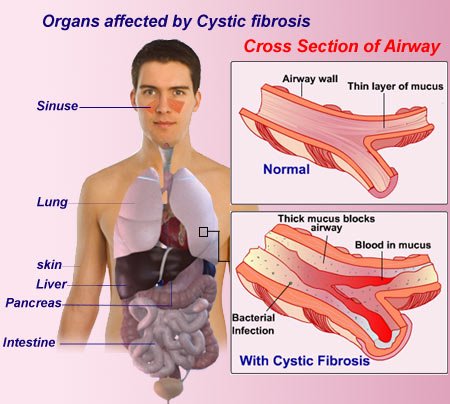Cystic Fibrosis (CF) is a complex genetic disorder that affects thousands of people worldwide. It primarily targets the respiratory and digestive systems, leading to severe complications and reduced life expectancy. In this blog, we will delve into the mysteries of CF, exploring its causes, symptoms, diagnosis, treatment options, and the challenges faced by those living with this condition. By shedding light on this lesser-known disease, we hope to increase awareness, foster empathy, and inspire support for the CF community.

The Genetic Basis of Cystic Fibrosis
Cystic Fibrosis is caused by a mutation in the cystic fibrosis transmembrane conductance regulator (CFTR) gene, which is responsible for producing a protein that regulates the flow of salt and water in and out of cells. The most common mutation is known as ΔF508, affecting both copies of the CFTR gene. Inheritance follows an autosomal recessive pattern, meaning that an individual must inherit two defective copies of the gene, one from each parent, to develop CF. Genetic testing can determine carrier status and help identify the risk of having a child with CF.
Unraveling the Symptomatology of Cystic Fibrosis
Cystic Fibrosis affects various systems of the body, primarily the lungs and the digestive system. The hallmark symptom of CF is thick, sticky mucus that clogs the airways, leading to chronic lung infections and respiratory difficulties. Other common symptoms include persistent coughing, wheezing, shortness of breath, and recurrent lung infections. CF also affects the pancreas, leading to impaired digestion and malabsorption of vital nutrients, resulting in poor growth and weight gain. Additionally, CF can impact the liver, sweat glands, and reproductive system, presenting a wide range of symptoms and complications unique to each individual.
Diagnosing Cystic Fibrosis: Navigating the Challenges
Diagnosing CF can be complex and often requires a multidisciplinary approach. Newborn screening is a crucial tool for early detection, as it enables the identification of infants with CF before they display symptoms. Sweat tests, genetic testing, lung function tests, and imaging studies are commonly used to confirm a diagnosis or assess disease progression. Due to the wide variability in symptoms and their presentation, diagnosing CF accurately can be challenging, and delays in diagnosis may occur. Early diagnosis is essential to initiate timely interventions and improve outcomes for individuals with CF.
Living with Cystic Fibrosis: Challenges and Coping Strategies
Living with CF poses numerous challenges for individuals and their families. Managing daily treatments, including airway clearance techniques, medication regimens, and nutritional interventions, can be time-consuming and physically demanding. Frequent hospitalizations, infections, and limitations on physical activities can also impact social and emotional well-being. However, advancements in treatment and care have significantly improved the quality of life for individuals with CF. Support from healthcare professionals, CF-specific multidisciplinary care teams, and patient advocacy groups play a vital role in providing guidance, education, and emotional support to individuals and their families.
Therapeutic Approaches and Future Directions
Over the years, significant progress has been made in the treatment of CF. Current therapies aim to alleviate symptoms, manage complications, and slow disease progression. These include airway clearance techniques, enzyme replacement therapy, antibiotics, and gene-based therapies. Trikafta, a groundbreaking medication approved in recent years, targets the underlying defect in the CFTR protein, significantly improving lung function and overall health.
Research and Innovations: The Quest for a Cure
Scientific research continues to drive innovations and advancements in the field of cystic fibrosis. Scientists and medical professionals are tirelessly working to develop new therapies, gene editing techniques, and gene therapies to target the root cause of CF.
The use of gene-editing technologies like CRISPR-Cas9 holds promise for correcting the CFTR gene mutations and potentially curing CF in the future. Additionally, advancements in personalized medicine and precision therapies are paving the way for more tailored treatments based on an individual’s specific genetic mutations.
Supporting the CF Community: Awareness and Advocacy
Raising awareness about cystic fibrosis is crucial to foster understanding and support for individuals living with the condition. Advocacy organizations and support groups play a vital role in providing resources, information, and emotional support for patients, families, and caregivers.
Events such as World Cystic Fibrosis Day help to bring attention to the disease and encourage fundraising for research and support initiatives. By participating in these efforts, individuals can contribute to improving the lives of those affected by CF and help advance scientific research towards finding a cure.
Conclusion
Cystic Fibrosis is a challenging genetic disorder that affects multiple systems in the body. By understanding its genetic basis, symptomatology, diagnosis, and treatment options, we can support individuals with CF and their families. Advances in research and medical innovations offer hope for improved therapies and a potential cure in the future. Increased awareness and advocacy efforts are essential for enhancing public understanding, supporting the CF community, and driving research funding. Let us join hands in spreading awareness, supporting those affected by CF, and working towards a future where cystic fibrosis no longer poses a significant health burden.










